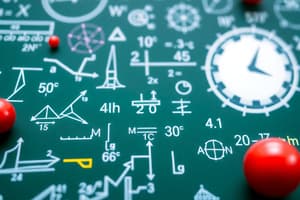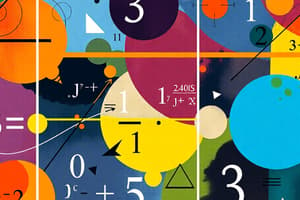Podcast
Questions and Answers
Graphs are visual representations of relationships between variables.
Graphs are visual representations of relationships between variables.
True (A)
Inductive Reasoning involves using general principles to reach specific conclusions.
Inductive Reasoning involves using general principles to reach specific conclusions.
False (B)
Circles are defined as shapes with straight sides.
Circles are defined as shapes with straight sides.
False (B)
Euclidean Geometry studies shapes in curved spaces.
Euclidean Geometry studies shapes in curved spaces.
Proofs demonstrate that a statement is always true.
Proofs demonstrate that a statement is always true.
Mathematics is the study of quantities, structures, space, and change.
Mathematics is the study of quantities, structures, space, and change.
Algebra primarily focuses on the study of shapes and sizes.
Algebra primarily focuses on the study of shapes and sizes.
Geometry deals with the relationships between angles and sides of triangles.
Geometry deals with the relationships between angles and sides of triangles.
Calculus is focused on rates of change and the accumulation of quantities.
Calculus is focused on rates of change and the accumulation of quantities.
Statistics is solely concerned with the study of theoretical mathematics.
Statistics is solely concerned with the study of theoretical mathematics.
Addition is the process of finding the difference between two quantities.
Addition is the process of finding the difference between two quantities.
Problem-solving in mathematics includes evaluating results and considering alternative approaches.
Problem-solving in mathematics includes evaluating results and considering alternative approaches.
Equations are statements of inequality between two expressions.
Equations are statements of inequality between two expressions.
Flashcards
Inequalities
Inequalities
Statements showing how two expressions compare, not just equal.
Deductive Reasoning
Deductive Reasoning
Using rules to reach a sure conclusion.
Points
Points
Basic location in geometry, no size.
Euclidean Geometry
Euclidean Geometry
Signup and view all the flashcards
Inductive Reasoning
Inductive Reasoning
Signup and view all the flashcards
Mathematics definition
Mathematics definition
Signup and view all the flashcards
Arithmetic
Arithmetic
Signup and view all the flashcards
Algebra definition
Algebra definition
Signup and view all the flashcards
Geometry's focus
Geometry's focus
Signup and view all the flashcards
Calculus's focus
Calculus's focus
Signup and view all the flashcards
Problem-solving step 1
Problem-solving step 1
Signup and view all the flashcards
Addition definition
Addition definition
Signup and view all the flashcards
Equation's purpose
Equation's purpose
Signup and view all the flashcards
Study Notes
Fundamental Concepts
- Mathematics is the study of quantities, structures, space, and change.
- It involves using logical reasoning and abstract thinking to solve problems.
- It encompasses various branches, each with its own set of principles and techniques.
Branches of Mathematics
- Arithmetic: Deals with basic operations like addition, subtraction, multiplication, and division of numbers.
- Algebra: Uses symbols and variables to represent unknown quantities and solve equations.
- Geometry: Studies shapes, sizes, positions, and properties of figures in space.
- Calculus: Focuses on rates of change and accumulation of quantities. Includes differential and integral calculus.
- Trigonometry: Deals with the relationships between angles and sides of triangles.
- Statistics: Collects, analyzes, and interprets numerical data.
- Probability: Studies the likelihood of events occurring.
- Number Theory: Investigates properties of numbers.
- Discrete Mathematics: Deals with finite or countable sets and structures.
- Linear Algebra: Focuses on vector spaces and linear transformations.
Mathematical Systems
- Set Theory: Defines sets, their properties, and operations.
- Logic: Provides a framework for reasoning, deduction, and proof.
- Axiomatic Systems: Establish rules and postulates to define mathematical structures.
- Groups, Rings, and Fields: Abstract algebraic structures with specific properties of binary operations.
Basic Operations
- Addition: Combining two or more quantities.
- Subtraction: Finding the difference between two quantities.
- Multiplication: Repeated addition of a quantity.
- Division: Finding how many times one quantity is contained within another.
Problem Solving Strategies
- Identifying the problem: Clearly defining the question.
- Devising a plan: Brainstorming possible solutions.
- Carrying out the plan: Implementing the chosen method.
- Looking back: Evaluating the results and considering alternative approaches.
Applications of Mathematics
- Science: Used for modeling and predicting natural phenomena.
- Engineering: Used for designing and analyzing structures.
- Computer Science: Used for algorithms, data structures, and problem-solving.
- Finance: Used for investment strategies, risk management and budgeting.
- Business: Used for data analysis, forecasting, and optimization.
Mathematical Tools
- Equations: Statements of equality between two expressions.
- Inequalities: Statements of inequality between two expressions.
- Graphs: Visual representations of relationships between variables.
- Tables: Organised representation of data.
- Models: Abstract representations of real-world phenomena.
Mathematical Reasoning
- Deductive Reasoning: Using general principles to reach specific conclusions.
- Inductive Reasoning: Drawing general conclusions from specific observations.
- Proofs: Demonstrations that a statement is always true.
Fundamental Concepts in Geometry
- Points: Basic building blocks of geometric figures.
- Lines: One-dimensional extensions of points.
- Planes: Two-dimensional surfaces.
- Angles: Formed by two rays that share a common endpoint.
- Polygons: Closed shapes with straight sides.
- Circles: Closed curves with all points equidistant from a central point.
Branches of Geometry
- Euclidean Geometry: Studies shapes and figures in a flat space.
- Non-Euclidean Geometry: Studies shapes in curved spaces.
Studying That Suits You
Use AI to generate personalized quizzes and flashcards to suit your learning preferences.




